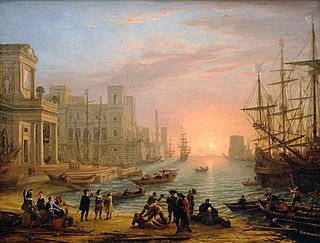
Mercantilism is an economic policy that is designed to maximize the exports and minimize the imports for an economy. It promotes imperialism, colonialism, tariffs and subsidies on traded goods to achieve that goal.
The Tariff Act of 1789 was the first major piece of legislation passed in the United States after the ratification of the United States Constitution and it had two purposes. It was to protect manufacturing industries developing in the nation and was to raise revenue for the federal government. It was sponsored by Congressman James Madison, passed by the 1st United States Congress, and signed into law by President George Washington. The act levied a 50¢ per ton duty on goods imported by foreign ships; American-owned vessels were charged 6¢ per ton.
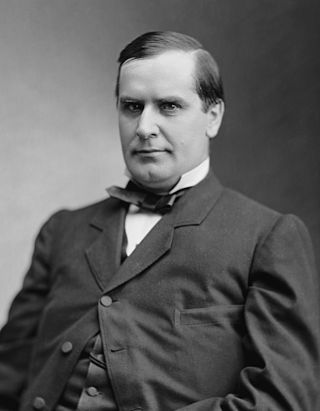
The Tariff Act of 1890, commonly called the McKinley Tariff, was an act of the United States Congress, framed by then Representative William McKinley, that became law on October 1, 1890. The tariff raised the average duty on imports to almost fifty percent, an increase designed to protect domestic industries and workers from foreign competition, as promised in the Republican platform. It represented protectionism, a tactic supported by Republicans and denounced by Democrats. It was a major topics for fierce debate in the 1890 Congressional elections, which gave a Democratic landslide.

Protectionism, sometimes referred to as trade protectionism, is the economic policy of restricting imports from other countries through methods such as tariffs on imported goods, import quotas, and a variety of other government regulations. Proponents argue that protectionist policies shield the producers, businesses, and workers of the import-competing sector in the country from foreign competitors. Opponents argue that protectionist policies reduce trade and adversely affect consumers in general as well as the producers and workers in export sectors, both in the country implementing protectionist policies and in the countries protected against.
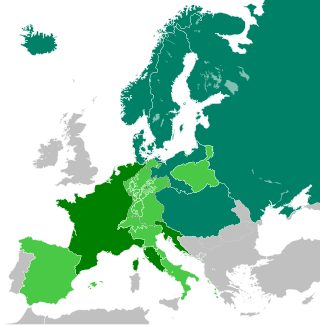
The Continental Blockade, or Continental System, was a large-scale embargo by Napoleon Bonaparte against the British Empire from 21 November 1806 until 11 April 1814, during the Napoleonic Wars. Napoleon issued the Berlin Decree on 21 November 1806 in response to the naval blockade of the French coasts enacted by the British government on 16 May 1806. The embargo was applied intermittently, ending on 11 April 1814 after Napoleon's first abdication.

The Methuen Treaty was a military and commercial treaty between England and Portugal that was signed in 1703 as part of the War of the Spanish Succession.

The Empire of Brazil was a 19th-century state that broadly comprised the territories which form modern Brazil and Uruguay. Its government was a representative parliamentary constitutional monarchy under the rule of Emperors Dom Pedro I and his son Dom Pedro II. A colony of the Kingdom of Portugal, Brazil became the seat of the Portuguese Empire in 1808, when the Portuguese Prince regent, later King Dom John VI, fled from Napoleon's invasion of Portugal and established himself and his government in the Brazilian city of Rio de Janeiro. John VI later returned to Portugal, leaving his eldest son and heir-apparent, Pedro, to rule the Kingdom of Brazil as regent. On 7 September 1822, Pedro declared the independence of Brazil and, after waging a successful war against his father's kingdom, was acclaimed on 12 October as Pedro I, the first Emperor of Brazil. The new country was huge, sparsely populated and ethnically diverse.
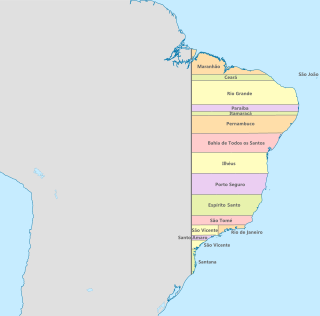
Colonial Brazil comprises the period from 1500, with the arrival of the Portuguese, until 1815, when Brazil was elevated to a kingdom in union with Portugal as the United Kingdom of Portugal, Brazil and the Algarves. During the early 300 years of Brazilian colonial history, the economic exploitation of the territory was based first on brazilwood extraction, which gave the territory its name; sugar production ; and finally on gold and diamond mining. Slaves, especially those brought from Africa, provided most of the work force of the Brazilian export economy after a brief period of Indian slavery to cut brazilwood.

The First Brazilian Republic, also referred to as the Old Republic, officially the Republic of the United States of Brazil, refers to the period of Brazilian history from 1889 to 1930. The Old Republic began with the deposition of Emperor Pedro II in 1889, and ended with the Brazilian Revolution of 1930 that installed Getúlio Vargas as a new president. During the First Brazilian Republic, Brazil was dominated by a form of machine politics known as coronelism, in which the political and economic spheres were dominated by large landholders. The most powerful of such landholders were the coffee industry of São Paulo and the dairy industry of Minas Gerais. Because of the power of these two industries, the Old Republic's political system has been described as "milk coffee politics."
The Anglo-Irish Trade War was a retaliatory trade war between the Irish Free State and the United Kingdom from 1932 to 1938. The Irish government refused to continue reimbursing Britain with land annuities from financial loans granted to Irish tenant farmers to enable them to purchase lands under the Irish Land Acts in the late nineteenth century, a provision which had been part of the 1921 Anglo-Irish Treaty. This resulted in the imposition of unilateral trade restrictions by both countries, causing severe damage to the Irish economy.

The economic history of Brazil covers various economic events and traces the changes in the Brazilian economy over the course of the history of Brazil. Portugal, which first colonized the area in the 16th century, enforced a colonial pact with Brazil, an imperial mercantile policy, which drove development for the subsequent three centuries. Independence was achieved in 1822. Slavery was fully abolished in 1888. Important structural transformations began in the 1930s, when important steps were taken to change Brazil into a modern, industrialized economy.

The Eden Treaty was a treaty signed between Great Britain and France in 1786, named after the British negotiator William Eden, 1st Baron Auckland (1744–1814). It effectively ended, for a brief time, the economic war between France and Great Britain and set up a system to reduce tariffs on goods from either country. It was spurred on in Britain by the secession of the thirteen American colonies, and the publication of Adam Smith's Wealth of Nations. British Prime Minister William Pitt the Younger was heavily influenced by the ideas of Smith, and was one of the key motivators of the treaty. Obstinancy in negotiations on the part of the British made the commercial agreement almost wholly beneficial to the British, and the unequal protection on certain industries ended up hurting the French economy. This treaty is often considered to be one of the grievances of the French people that sparked the French Revolution. The treaty collapsed in 1793, following claims in the National Convention that the Aliens Act 1793 breached the terms of the treaty and the outbreak of war in early February between Great Britain and France ended any chance of a compromise.

The Treaty of El Pardo signed on 11 March 1778 sought to end conflict between Spain and Portugal in the Río de la Plata region, along the modern boundary between Argentina and Uruguay. It confirmed Spanish ownership of Colonia del Sacramento, now in Uruguay, while Portugal ceded possession of strategically important territories in Africa, now the modern state of Equatorial Guinea. In return, Spain withdrew from lands to the north, most of which are in the southern Brazilian state of Rio Grande do Sul.
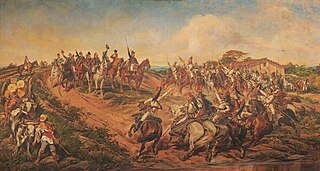
The Independence of Brazil comprised a series of political and military events that led to the independence of the Kingdom of Brazil from the United Kingdom of Portugal, Brazil and the Algarves as the Brazilian Empire. Most of the events occurred in Bahia, Rio de Janeiro, and São Paulo between 1821–1824.

The Portuguese royal court transferred from Lisbon to the Portuguese colony of Brazil in a strategic retreat of Queen Maria I of Portugal, Prince Regent John, the Braganza royal family, its court, and senior functionaries, totaling nearly 10,000 people, on 27 November 1807. The embarkment took place on the 27th, but due to weather conditions, the ships were only able to depart on the 29 November. The Braganza royal family departed for Brazil just days before Napoleonic forces invaded Portugal on 1 December 1807. The Portuguese crown remained in Brazil from 1808 until the Liberal Revolution of 1820 led to the return of John VI of Portugal on 26 April 1821.

The economy of the Empire of Brazil was centered on export of raw materials when the country became independent in 1822. The domestic market was small, due to lack of credit and the almost complete self-sustainability of the cities, villages and farms that dedicated themselves to food production and cattle herding. During the first half of the 19th century, the Imperial Government invested heavily in the improvement of roads while retaining an excellent system of ports. The former facilitated better commercial exchange and communication between the country's distant regions; the latter did the same for foreign trade.

Brazil produces about a third of the world's coffee, making the country by far the world's largest producer. Coffee plantations, covering some 27,000 km2 (10,000 sq mi), are mainly located in the southeastern states of Minas Gerais, São Paulo and Paraná where the environment and climate provide ideal growing conditions.
A Mixed Commission Court was a joint court set up by the British government with Dutch, Spanish or Portuguese representation following treaties agreed in 1817 and 1818. By 1820 there were 6 courts: This occurred during a period often referred to as Pax Britannica, a period of British hegemony following the defeat of the Napoleonic Empire.

The Treaty of Madrid, also known as the Treaty of Aquisgran, was a commercial treaty between Britain and Spain, formally signed on 5 October 1750 in Madrid.
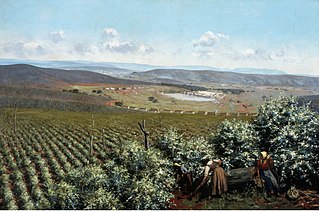
The coffee cycle was a period in Brazil's economic history, beginning in the mid-19th century and ending in 1930, in which coffee was the main export product of the Brazilian economy. The coffee cycle succeeded the gold cycle, which had come to an end after the exhaustion of the mines a few decades earlier, and put an end to the economic crisis generated by this decadence.

















